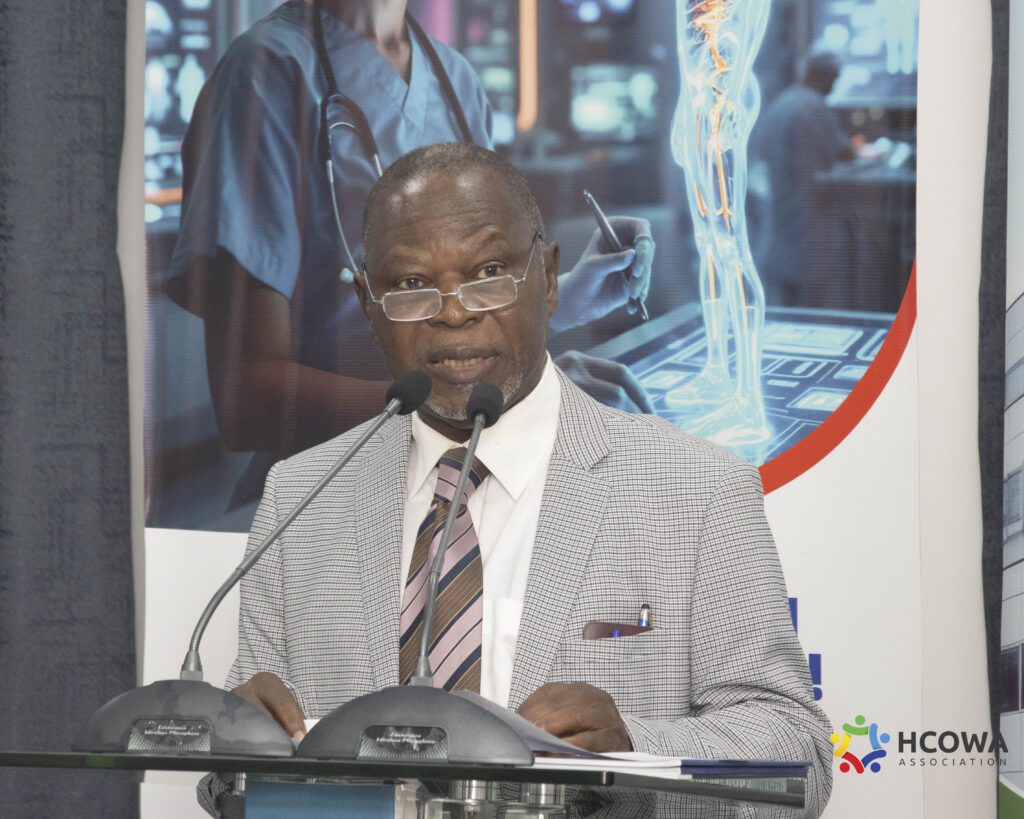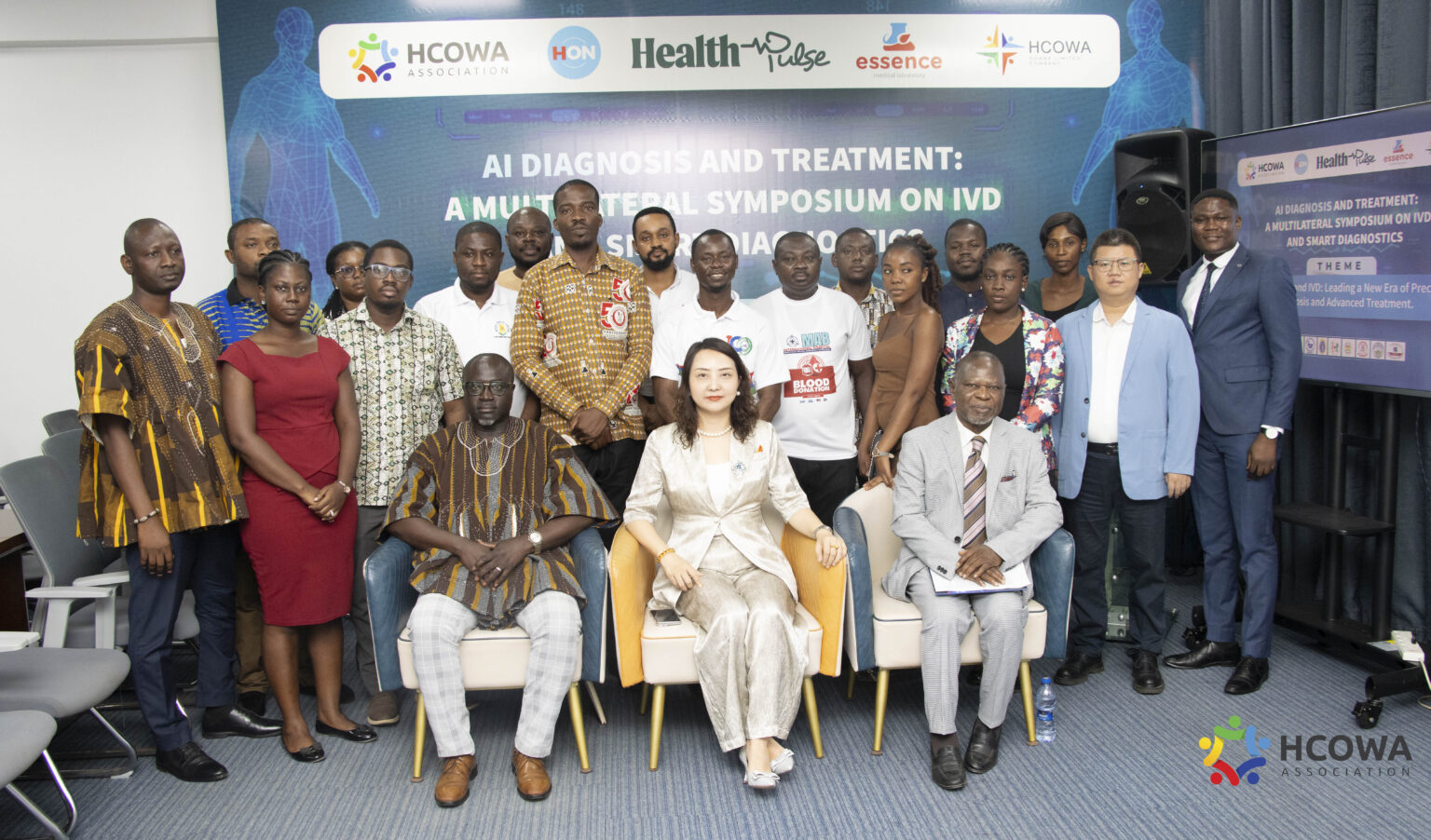The Health Community of West Africa (HCOWA) Association has successfully held its Third Conference today, 7th March 2025, under the theme:
Harnessing AI and IVD: Leading a New Era of Precision Diagnosis and Advanced Treatment.
This significant event, which is part of a broader conference series launched by HCOWA in January 2025, focuses on Integrating Artificial Intelligence (AI) into the health sector across West Africa. The conference brought together key stakeholders, including representatives from Ghana Health Service, the Ghana College of Physicians and Surgeons, the Nigeria Society of Physiotherapy, and leading Chinese AI experts.
Keynote Address Emphasizes AI’s Transformative Potential
The conference opened with an insightful keynote address delivered by Professor Samuel Debrah, who highlighted the growing involvement of global technology giants such as Apple, Microsoft, and Amazon in AI-driven healthcare innovation. Professor Debrah underscored how these companies are leveraging AI to improve disease diagnosis, treatment development, and preventive care.
While acknowledging the transformative potential of AI, Professor Debrah also highlighted critical ethical and regulatory issues surrounding its adoption. He stressed the need for robust data privacy protections, safeguards against algorithmic bias, and compliance with regulatory and professional standards to ensure that AI serves as a tool for empowerment rather than exclusion.
HCOWA President Calls for Regional Collaboration
In his opening remarks, the President of the Health Community of West Africa Association emphasized the strategic importance of this conference for West Africa’s healthcare future. He noted that with health systems across the region facing mounting challenges, the adoption of AI and advanced diagnostic technologies could play a vital role in improving early detection, treatment accuracy, and patient outcomes, especially in underserved communities.
The President further stressed that collaboration between governments, private sector innovators, and health institutions is essential to ensuring that technological advancements benefit the entire population, leaving no one behind.
Panel Discussion Explores AI and IVD Integration
A panel discussion featuring five distinguished experts formed a core segment of the conference. Panelists provided in-depth perspectives on the integration of AI and in vitro diagnostic (IVD) technologies into healthcare systems across West Africa.
The panel explored how AI-powered diagnostics can enhance clinical decision-making, enable personalized treatment plans, and support telemedicine initiatives, particularly in rural and remote areas.

While the experts highlighted the numerous benefits of AI in enhancing diagnostic accuracy and improving operational efficiencies, they also cautioned against potential risks, including data misuse, technological inequality, and the need for regulatory oversight.
They stressed the importance of upskilling healthcare professionals, building digital infrastructure, and establishing strong ethical frameworks to guide the responsible deployment of AI technologies in healthcare.
Virtual Symposium Enhances Regional Participation
The conference attracted approximately 100 online participants, including representatives from hospitals, medical institutions, and healthcare professionals from across West Africa.
This virtual engagement allowed for real-time contributions, enabling participants to ask questions, share experiences, and provide regional insights during the discussions. The interactive platform fostered knowledge exchange and cross-border collaboration, helping to shape a common understanding of the opportunities and challenges surrounding AI adoption in West African healthcare systems.
Shaping the Future of AI and Smart Diagnostics
As the conference concluded, several key recommendations emerged to guide the integration of artificial intelligence and smart diagnostics into healthcare systems across West Africa. One of the primary recommendations highlighted the urgent need for greater investment in digital health infrastructure to support the seamless adoption of AI technologies.
Participants also stressed the importance of developing comprehensive capacity-building programs aimed at equipping healthcare professionals with the necessary skills and knowledge to effectively utilize AI tools in clinical settings. Additionally, the conference underscored the need for clear regulatory and ethical guidelines to govern the deployment of AI in healthcare, ensuring patient safety, data privacy, and equitable access to advanced diagnostic solutions.
Another vital recommendation focused on strengthening regional cooperation to facilitate the sharing of data, the exchange of best practices, and the collaborative development of innovative healthcare solutions tailored to the specific needs of West African countries.
The Health Community of West Africa Association reaffirmed its commitment to promoting innovation, driving technology adoption, and enhancing capacity building across the region’s health systems, ensuring that the transformative potential of AI and smart diagnostics contributes to the advancement of healthcare for all.
The success of this third conference sets the stage for continued dialogue, collaboration, and action aimed at ensuring that AI and smart diagnostics play a transformative role in strengthening healthcare delivery across West Africa.



